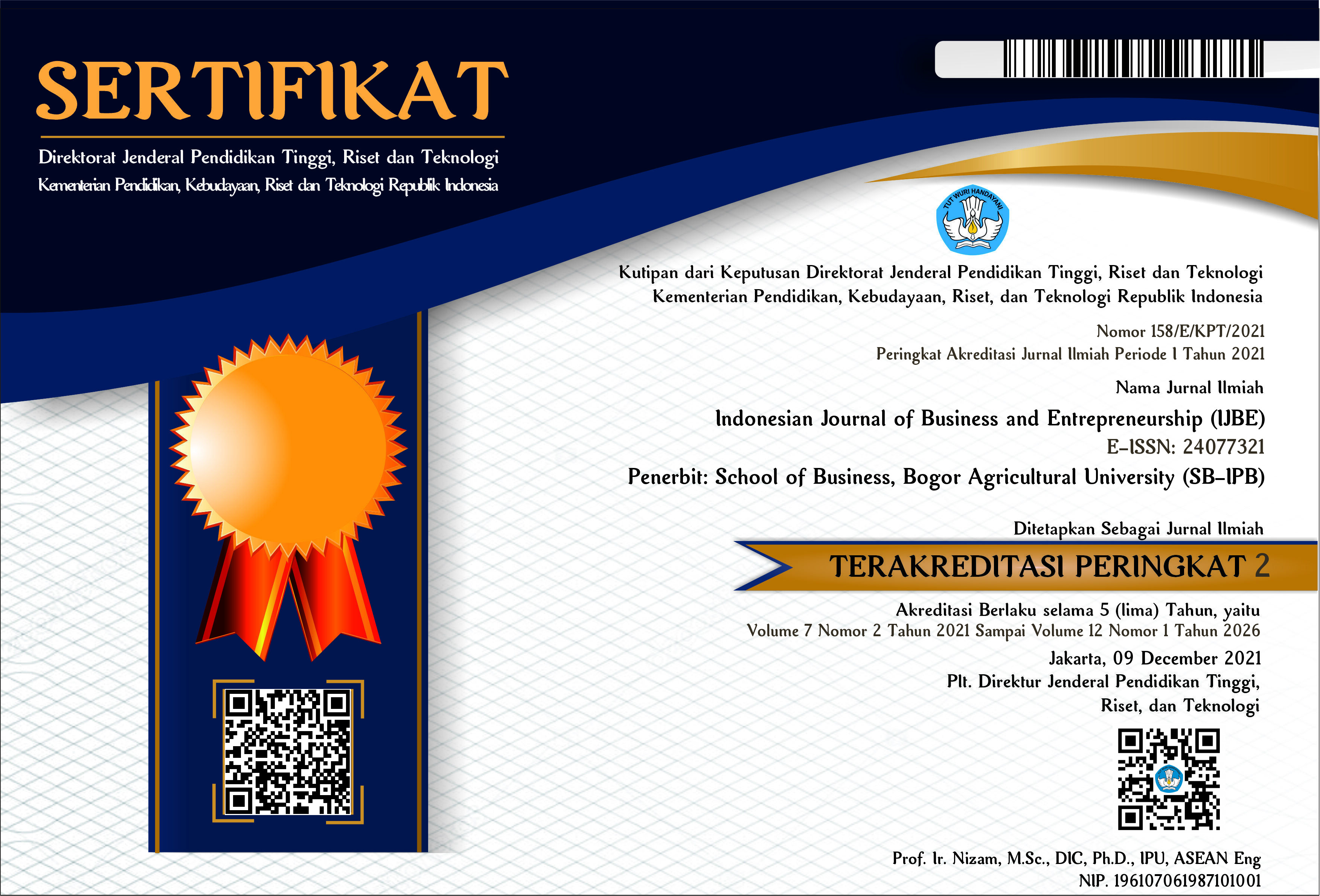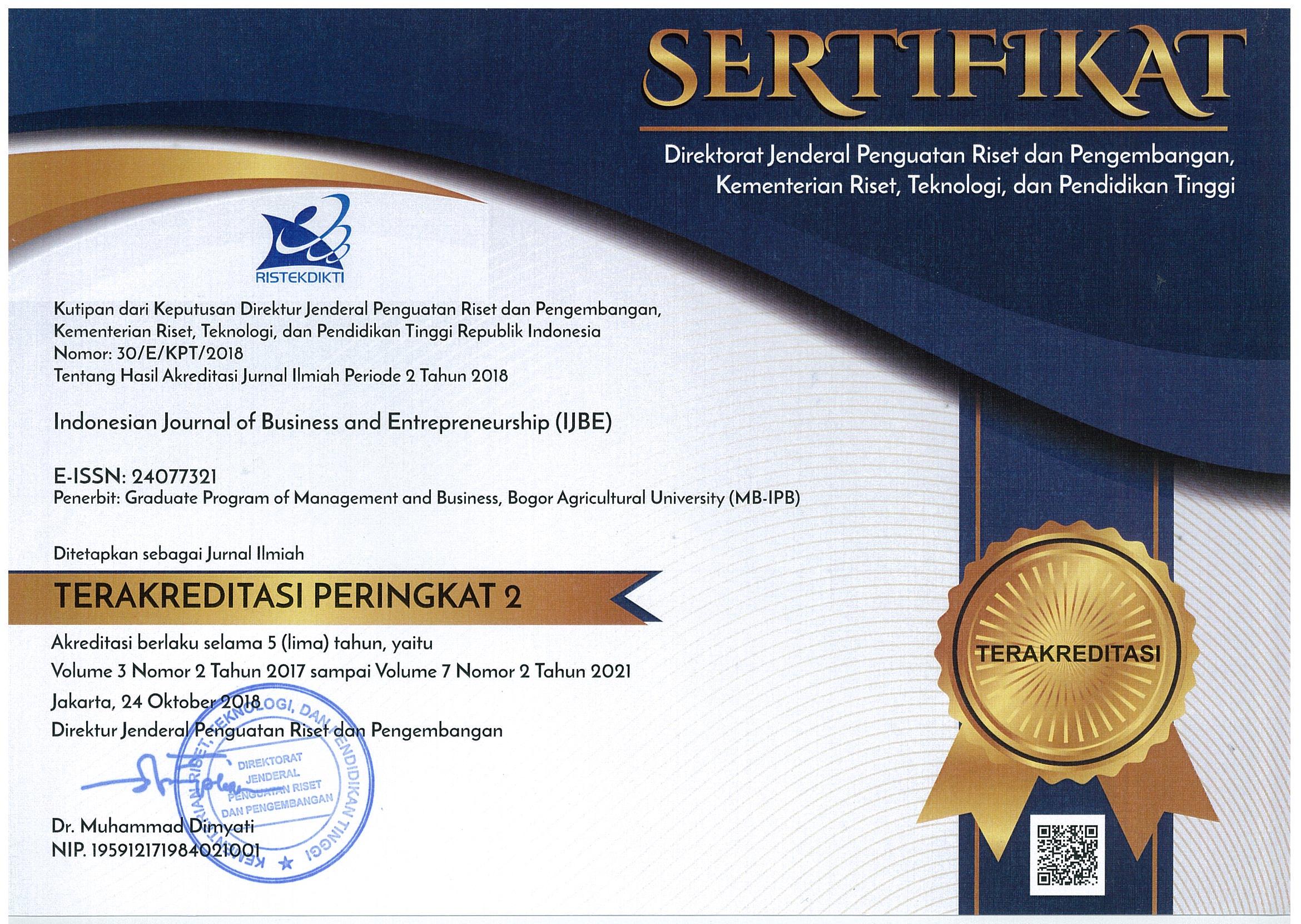FACTORS INFLUENCING THE LEARNING SUCCESS OF MASTER STUDENTS AT IPB BUSINESS SCHOOL (SB-IPB)
Abstract
Business School of IPB (SB-IPB) has a low level of completing of study for its master program students on-time. Based on the report of SB-IPB 2015, only 0.8% of students graduating in 2014/2015 successfully completed their study in the normal time of thesis writing. This study aims to identify what factors cause the students unable to complete their thesis on time, thus affecting their learning success. The primary data in this study came from interviews to the students of year 2011/2012, while the secondary data were obtained from the academic section of SB-IPB. Determination of the number of samples was done using slovin formula obtaining 80 students as the respondents. The data analysis method used was SEM with PLS method. The results of the research indicate that the indicator that has a dominant role on the student characteristics is employment status while the dominant role indicators on the process of thesis writing are the suitability of area of interest and the administrative process. The value of the characteristics of students significantly affecting the process of their thesis writing is-0.283, and this indicates that students who are full time workers have a number of constraints in their thesis writing process. Likewise, the process of the thesis writing has a significant influence on the success of the study i.e. 0.346, and it means that the easier the process of thesis writing, the greater the success of their study. The academic division is expected to be more active in controlling the students who are in the process of writing their thesis, especially for the class whose students work full time so that it can well support the learning success of the students.
Keywords: business school, master program, success of the study, PLS, SEM
ABSTRAK
Mahasiswa program magister di sekolah bisnis IPB (SB-IPB) memiliki tingkat ketepatan penyelesaian studi yang masih rendah. Berdasarkan laporan SB IPB 2015, hanya 0.8% mahasiswa yang lulus tahun 2014/2015 berhasil menyelesaikan studi dalam waktu normal penyusunan tesis. Penelitian ini bertujuan untuk mengidentifikasi faktor-faktor apa saja yang menyebabkan mahasiswa terlambat menyelesaikan tesis yang berdampak pada keberhasilan studi. Data primer dalam penelitian ini bersumber dari wawancara kepada mahasiswa tahun angkatan 2011/2012, sedangkan data sekunder bersumber dari bagian akademik SB-IPB. Penentuan jumlah sampel menggunakan rumus slovin diperoleh 80 mahasiswa sebagai responden. Metode analisis data yang digunakan, yaitu SEM dengan metode PLS. Hasil penelitian menunjukkan bahwa Indikator yang berperan dominan terhadap karakteristik mahasiswa yaitu status pekerjaan, sedangkan indikator yang berperan dominan terhadap proses penyusunan tesis yaitu kesesuaian bidang minat dan proses administrasi. Karakteristik mahasiswa signifikan memengaruhi proses penyusunan tesis sebesar -0.283. Artinya, mahasiswa yang aktif bekerja akan menghambat proses penyusunan tesisnya. Demikian juga proses penyusunan tesis berpengaruh signifikan pada keberhasilan studi sebesar 0.346. Artinya, semakin mudah proses penyusunan tesis maka akan semakin menigkatkan keberhasilan studi. Divisi akademik diharapkan dapat lebih aktif mengontrol mahasiswa yang sedang dalam proses penyusunan tesis terutama pada kelas yang mayoritas aktif bekerja untuk menunjang keberhasilan studi mahasiswa yang lebih baik.
Keywords: sekolah bisnis, program magister, keberhasilan studi, PLS, SEM
Downloads
References
Abiddin NZ, Ismail A. 2011. Attrition and completion issues in postgraduate studies for student development. International Review of Social Sciences and Humanities 1(1): 15–29.
Bain S, Fedynich LV, Knight M. 2009. The successful graduate student: A review of the factors for success. Journal of Academic & Business Ethics 1(3): 1–9.
Barnes BJ. 2010. The nature of exemplary doctoral advisors' expectations and the ways they may influence doctoral persistence. Journal of College Student Retention: Research, Theory & Practice 11(3): 323–343.
Frihadian RZ, Purwito A, Sitanggang IS. 2016. Perbaikan kualitas berkelanjutan penyelenggaraan akademik program sarjana ilmu komputer FMIPA IPB. Jurnal Aplikasi Bisnis dan Manajemen 2(2):207–217.
Ghozali I. 2008. Structural Equation Modeling Metode Alternatif dengan Partial Least Square (PLS). Semarang: UNDIP.
Guillory CW. 2008. A multilevel discrete time hazard model of retention data in higher education [Disertasi]. Louisiana: Louisiana State University.
Jinarek V. 2010. Potential predictors of timely completion among dissertation research students at an Australian Faculty of Sciences. International Journal of Doctoral Studies 8 (63):83–104.
Jones M. 2013. Issues in doctoral studies – Forty years of journal discussion: where have we been and where are we going. International Journal of Doctoral Studies 8 (6):83–104.
Kearns H, Gardiner M, Marshall K. 2008. Innovation in PhD completion: The hardy shall succeed (and be happy!). Higher Education Research & Development 27:77–89.
Kusnendar K, Suwachid, Wijayanto DS. Analisis penghambat penyelesaian studi mahasiswa S1 Program Studi Pendidikan Teknik Mesin Jurusan Pendidikan Teknik dan Kejuruan Fakultas Keguruan dan Ilmu Pendidikan. Jurnal Universitas Sebelas Maret 1(3): 1–12.
Manathunga C. 2005. Early warning signs in postgraduate research education: a different approach to ensuring timely completions. Teaching in Higher Education 10: 219–233.
Mircea M, Andreescu AI. 2011. Using cloud computing in higher education: A strategy to improve agility in the current financial crisis. Journal of Communications of the IBIMA 2011(2011): 1–15. doi: 10.5171/2011.875547.
Laila RAN. 2016. Evaluasi jasa pendidikan program pascasarjana di Institut Pertanian Bogor [tesis]. Bogor: Program Pascasarjana IPB.
Nasution MN. 2010. Manajemen Perubahan. Jakarta: Ghalia Indonesia.
Nurmianto E, Siswanto N. 2006. Perancangan penilaian kinerja karyawan berdasarkan kompetensi spencer dengn metode analytical hierarchy process. Jurnal Teknik Industri 8(1): 40–53.
Oonyu JC, Wamala R. 2012. Completion time dynamics for master’s and doctoral studies at Makerere University. Contemporary Issues In Education Research-Second Quarter 5(2):140–146.
Pitchforth J, Beames S, Thomas A, Falk M, Farr C, Gasson S, Thamrin SA, Mengersen K. 2012. Factors affecting timely completion of a Phd: A complex systems approach. Journal of the Scholarship of Teaching and Learning 12(4): 124–135.
Sevilla CG, Ochave JA, Punsalan TG, Regala BP, Uriarte GG. 1993. Pengantar Metode Penelitian. Tuwu A, penerjemah. Jakarta: UI Pr. Terjemahan dari An Introduction to Reasearch Methods.
Siregar F. 2015. Kajian waktu penyelesaian studi mahasiswa sekolah pascasarjana IPB dan implikasi manajerialnya [Tesis]. Bogor: Program Pascasarjana IPB.
Spaulding LS, Szapkiw AJR. 2012. Hearing their voices: Factors doctoral candidates attribute to their persistence. International Journal of Doctoral Studies 7:199–219.
Sujova A, Rajnoha R. 2012. The management model of strategic change based on process principles. Procedia-Social and Behavioral Sciences 62(24): 1286–1291.
Swartling D, Poksinska B. 2013. Management initiation of continuous improvement from a motivational perspective. Journal of Applied Economics and Business Research 3(2): 81–94.
Trail C, Reiter HI, Bridge M, Stefanowska P, Schmuck M, Norman G. 2006. Impact of field of study, college and year on calculation of cumulative grade point average. Advances in Health Sciences Education 13: 253–261.
Webometrics. 2016. Ranking web of business schools in indonesia.http://business-schools.webometrics.info/en/Asia/Indonesia%20.[16September 2016].
Wibowo MG. 2013. Analisis efisiensi program studi dan fakultas pada Universitas Islam Negeri Sunan Kalijaga. Jurnal EKBISI 7(2): 261–279.
Yunis R, Surendro K. 2009. Perancangan model enterprise architecture dengan TOGAF architecture development method. Di dalam: Seminar Nasional Aplikasi Teknologi Informasi (SNATI); Yogyakarta, 20 Juni 2009. Yogyakarta: UII. hlm 25–31.
Yudhaningsih R. 2011. Peningkatan efektivitas kerja melalui komitmen, perubahan dan budaya organisasi. Jurnal Pengembangan Humaniora 11(1): 40–50.








